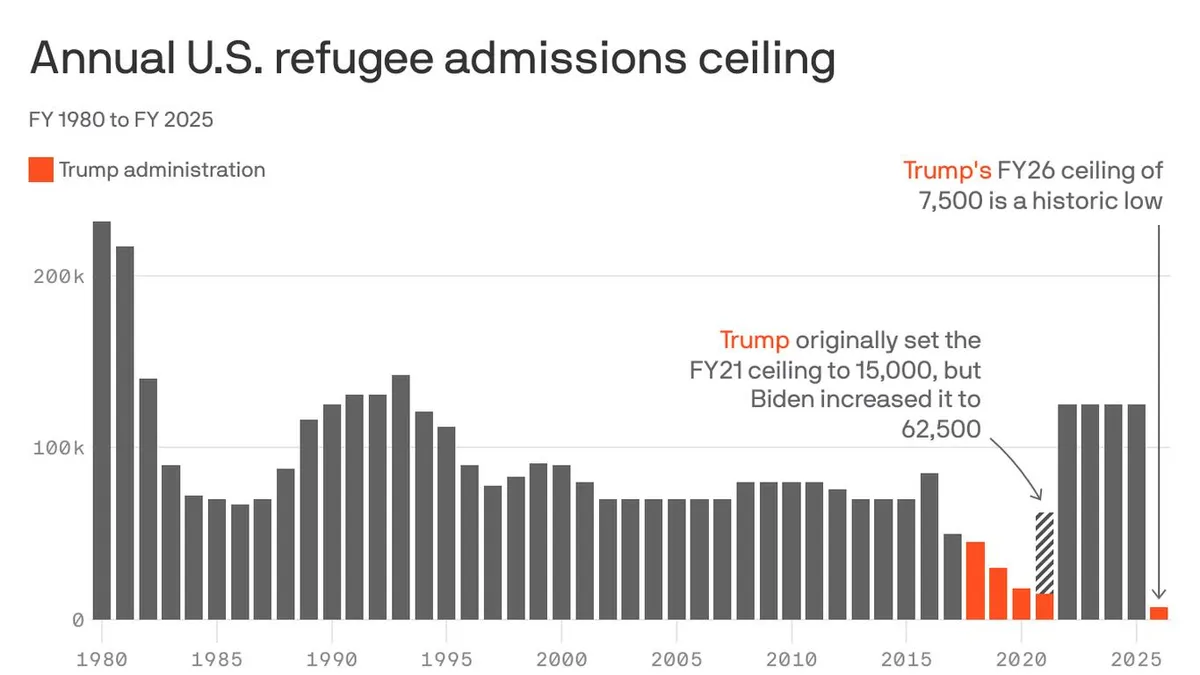
The Trump administration has announced a controversial decision to limit the number of refugees entering the United States in fiscal year 2026 to a mere 7,500 refugees. This unprecedented cap marks a significant departure from traditional U.S. refugee policies, particularly in comparison to the 125,000 refugees admitted during the final year of the Biden administration. The administration's new policy notably prioritizes the admission of Afrikaners, or white South Africans, into the country.
This drastic reduction in the refugee admission cap solidifies President Trump's pivot away from America's long-standing commitment to refugee protection. A senior administration official explained to Axios that the administration aims to put an end to what they describe as the previous administration's misuse of the refugee program. No refugees will be permitted entry in FY2026 until proper consultations with Congress are conducted, which are currently stalled due to the ongoing government shutdown.
The new refugee cap will be officially published in the Federal Register on Friday. The administration justifies the 7,500 admissions level based on humanitarian concerns and asserts that it serves the national interest. The majority of these admissions will be allocated to Afrikaners from South Africa, whom the administration claims have faced unjust racial discrimination. Additionally, the memo outlines that the admissions will extend to other groups subjected to illegal or unjust discrimination in their home countries.
In May, the Trump administration welcomed a group of Afrikaners, the white ethnic minority group known for implementing the apartheid system in South Africa. Apartheid, characterized by extreme racial segregation, was enforced from 1948 until the early 1990s. While some Afrikaners assert that they have faced employment and racial discrimination in South Africa since the end of apartheid, South African President Cyril Ramaphosa has rejected these claims.
It is important to note that President Trump has made unfounded allegations regarding South Africa's treatment of Afrikaners, claiming that the government is unfairly seizing their agricultural properties and allowing violence against white farmers. Prominent figures, including South African-born entrepreneur Elon Musk, have propagated conspiracy theories suggesting that there is a genocidal campaign against white individuals in South Africa. Musk's AI chatbot, Grok, has also shared misleading claims about this alleged genocide without user prompts.
The belief in a so-called "white genocide" is often tied to the fringe concept known as white replacement theory. This theory posits that there is a deliberate effort to alter the racial makeup of nations through policies that diminish the political influence of white populations. Despite some high-profile incidents, there is no credible evidence indicating a rise in violence against white South African farmers.
When President Trump first established refugee levels in FY2018, he authorized the admissions of 45,000 refugees, a staggering drop from the previous year's cap of 110,000. By the end of his first term, this number decreased further to 15,000. In contrast, President Biden raised the cap to 62,500 in his initial year, aiming to address urgent humanitarian needs and restore the United States' leadership in global humanitarian efforts.
The International Rescue Committee expressed deep disappointment regarding the newly established refugee cap, stating that the resettlement levels should prioritize the safety of the most at-risk refugees. They highlighted that over 100,000 refugees have already passed all necessary vetting processes and are awaiting their turn for resettlement. The committee emphasized that the announced cap for 2026 could lead to family separations and leave vulnerable individuals stranded in precarious situations.
The Trump administration's decision to limit refugee admissions to 7,500 for FY2026 represents a significant shift in U.S. refugee policy, raising concerns among humanitarian organizations and advocates. As discussions continue, the implications of this policy will be closely monitored, particularly regarding its impact on vulnerable populations seeking refuge in the United States.